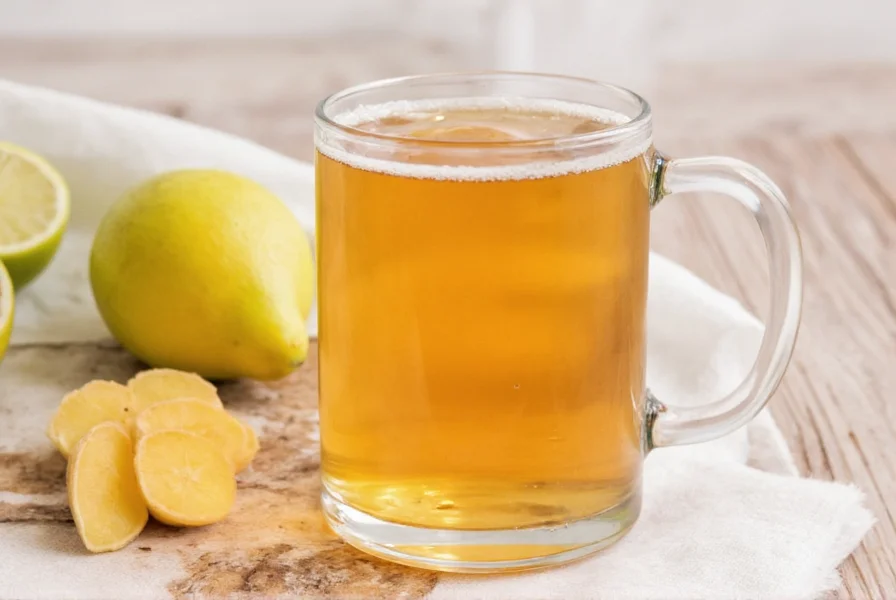When your stomach feels unsettled, reaching for ginger ale seems like a natural remedy passed down through generations. But does this popular carbonated beverage actually provide meaningful relief for digestive discomfort? The answer requires understanding both the science of ginger and the reality of what's in most ginger ale products today.
The Science Behind Ginger and Digestion
Ginger root contains bioactive compounds called gingerols and shogaols that interact with your digestive system in several beneficial ways. These compounds help regulate gastrointestinal motility, reduce inflammation in the gut lining, and block serotonin receptors associated with nausea. Multiple clinical studies have confirmed ginger's effectiveness for various forms of nausea, including morning sickness, chemotherapy-induced nausea, and motion sickness.
However, the critical factor is the concentration of these active compounds. For therapeutic effects, research suggests needing at least 1-1.5 grams of raw ginger or its equivalent. This is where most commercial ginger ales fall short.
Ginger Ale vs. Pure Ginger: A Significant Difference
Modern ginger ale products vary dramatically in their actual ginger content. Most mass-market brands use artificial ginger flavoring rather than real ginger extract, containing only trace amounts of the beneficial compounds. The popular "golden" style ginger ales typically contain even less active ginger than the drier "dry" style varieties.
| Ginger Product Type | Average Ginger Content | Sugar Content (per 12oz) | Therapeutic Effectiveness |
|---|---|---|---|
| Traditional "Dry" Ginger Ale | Moderate (0.1-0.3g) | 25-30g | Mild to moderate |
| "Golden" Style Ginger Ale | Low (trace amounts) | 35-40g | Minimal |
| Fresh Ginger Tea | High (1-1.5g+) | Negligible | Significant |
| Ginger Supplements | Standardized (1g) | Negligible | Most reliable |
What Research Says About Ginger Ale Specifically
While numerous studies confirm ginger's effectiveness for nausea and digestive issues, research specifically on ginger ale is limited. A 2019 review published in the Journal of Gastroenterology noted that carbonated beverages with genuine ginger content showed modest benefits for mild gastrointestinal distress, but emphasized that the high sugar content in most commercial products could potentially counteract these benefits, particularly for individuals with sensitive digestive systems.
The carbonation itself presents a double-edged sword. For some people with bloating or gas-related discomfort, the bubbles may worsen symptoms. However, for others experiencing nausea without significant bloating, the carbonation might provide a soothing sensation.
Choosing the Right Ginger Ale for Upset Stomach Relief
If you prefer using ginger ale for digestive comfort, consider these selection criteria:
- Check the ingredient list - Look for "ginger root extract" or "real ginger" near the beginning
- Avoid high-fructose corn syrup - Opt for products sweetened with cane sugar or preferably lower-sugar options
- Consider flat vs. carbonated - Letting the beverage go flat may reduce bloating for some individuals
- Look for higher ginger concentration - Some craft brands specifically market higher ginger content
For immediate relief during acute nausea, many healthcare providers recommend starting with small sips (1-2 tablespoons) every 5-10 minutes rather than drinking a full glass at once.

When Ginger Ale Might Not Be Your Best Option
Certain digestive conditions may make ginger ale less effective or potentially counterproductive:
- Diabetic concerns - The high sugar content in most ginger ales can affect blood glucose levels
- Acid reflux or GERD - Carbonation may increase pressure on the lower esophageal sphincter
- Severe vomiting - The sugar content might worsen dehydration during significant fluid loss
- Gastric bypass patients - Carbonation can cause uncomfortable expansion in reduced stomach capacity
For these situations, pure ginger tea (without added sugar) or standardized ginger supplements often provide more reliable relief without potential drawbacks.
Evidence-Based Alternatives to Ginger Ale
When commercial ginger ale doesn't provide sufficient relief, consider these research-supported alternatives:
- Fresh ginger tea - Steep 1-2 teaspoons of grated fresh ginger in hot water for 10 minutes
- Ginger chews or candies - Look for products with at least 50mg of ginger per serving
- Ginger supplements - Standardized to contain 1g of ginger root extract
- Peppermint tea - Effective for some types of indigestion and IBS symptoms
- BRAT diet - Bananas, rice, applesauce, and toast for settling the stomach after vomiting
A 2022 clinical trial comparing various natural remedies found that participants using standardized ginger supplements experienced 37% greater reduction in nausea symptoms compared to those using commercial ginger ale, highlighting the importance of active ingredient concentration.

When to Seek Medical Attention
While mild digestive upset often resolves with home remedies, certain symptoms warrant professional medical evaluation:
- Persistent vomiting lasting more than 24 hours
- Blood in vomit or stool
- Severe abdominal pain that doesn't improve
- Signs of dehydration (dark urine, dizziness, reduced urination)
- Symptoms lasting longer than 48-72 hours without improvement
Remember that while ginger-based remedies can help with symptom management, they don't address underlying conditions that might be causing your digestive distress. If you experience recurrent stomach issues, consult a healthcare provider to identify and treat the root cause.
Practical Tips for Using Ginger Effectively
For those who find ginger helpful for digestive comfort, these evidence-based usage tips can maximize benefits:
- Consume ginger before nausea becomes severe for best preventive effect
- Combine ginger with hydration - sip water alongside ginger remedies
- Try ginger in multiple forms throughout the day for sustained relief
- Avoid combining with other strong flavors that might overwhelm your system
- Store fresh ginger root in the freezer for quick access during digestive discomfort
Research suggests that ginger's effectiveness builds with consistent use, so incorporating it regularly may provide better long-term digestive support than using it only during acute episodes.
Conclusion: Managing Expectations with Ginger Ale
Ginger ale can provide mild relief for some types of stomach upset, particularly when it contains genuine ginger extract. However, its effectiveness is often limited by low ginger concentration and high sugar content in most commercial products. For reliable relief, consider alternatives with higher concentrations of active ginger compounds, and always consult a healthcare provider for persistent or severe digestive symptoms.
Understanding the difference between traditional remedies and evidence-based approaches helps you make informed decisions about managing digestive discomfort while avoiding potentially counterproductive treatments.
Does ginger ale really help with nausea from stomach flu?
Ginger ale may provide mild relief for stomach flu nausea if it contains real ginger extract, but many commercial brands have insufficient ginger content. The high sugar content can sometimes worsen dehydration during vomiting episodes. For better results, choose ginger ales with actual ginger root extract or consider ginger tea, which typically contains higher concentrations of the active compounds that reduce nausea.
How much ginger should be in ginger ale to help with upset stomach?
For therapeutic effects, ginger ale should contain at least 0.1-0.3 grams of ginger root extract per serving. Unfortunately, most mass-market ginger ales contain significantly less, often using artificial ginger flavor instead of real ginger. Check the ingredient list for "ginger root extract" near the beginning, which indicates higher ginger content. Traditional "dry" style ginger ales typically contain more actual ginger than "golden" style varieties.
Is flat ginger ale better for an upset stomach than carbonated?
For many people, flat ginger ale is better for upset stomach relief than fully carbonated. The carbonation can cause additional bloating and gas, which may worsen discomfort for those with sensitive digestive systems. Allowing ginger ale to go flat before drinking reduces this potential issue while still providing the ginger benefits. However, some people find the carbonation soothing for nausea, so individual responses may vary.
Can ginger ale help with acid reflux or GERD symptoms?
Ginger ale is generally not recommended for acid reflux or GERD. While ginger itself may have some benefits for digestion, the carbonation in ginger ale can increase pressure on the lower esophageal sphincter, potentially worsening reflux symptoms. Additionally, the sugar content may trigger increased stomach acid production. For acid reflux, healthcare providers typically recommend non-carbonated ginger tea or other remedies specifically designed for reflux management.
How quickly does ginger ale work for an upset stomach?
When effective, ginger ale typically begins providing relief within 15-30 minutes, though this varies based on the ginger concentration and individual response. For best results, sip small amounts (1-2 tablespoons) every 5-10 minutes rather than drinking a full glass at once. Note that many commercial ginger ales contain insufficient ginger for significant relief, so results may be minimal compared to remedies with higher ginger concentrations like fresh ginger tea or supplements.










 浙公网安备
33010002000092号
浙公网安备
33010002000092号 浙B2-20120091-4
浙B2-20120091-4